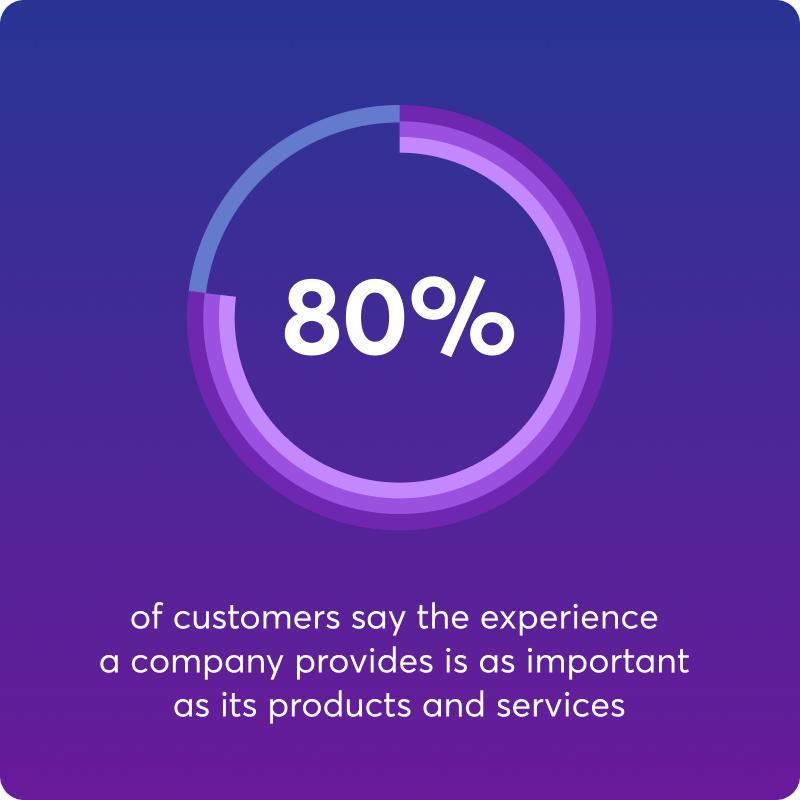11 Benefits of Customer Training That Drive Business Growth

A recent Salesforce report reveals that “80% of customers say the experience a company provides is as important as its products and services.” Consistency, efficiency, and a human touch form the recipe for a positive experience that wins customer loyalty.
Is it really any surprise?
By helping your customers understand and use your products and services better, you can significantly enhance customer experience, boost satisfaction, build loyalty, and strengthen your relationships with them.

Industries like tech, SaaS, and consumer electronics are often at the forefront of offering great customer education programs. These range from personalized onboarding and interactive tutorials to chatbots and on-demand resources.
As businesses keep growing and evolving, investing in customer education becomes a must for long-term success.
9000+ brands trust LearnWorlds to train their people, partners & customers.
What Can Your Business Achieve Through Customer Training?
Customer education and business growth often go hand in hand. Let’s break it down and see how exactly deploying customer training helps you grow your business!
1
Improve feature adoption
Deploying a customer education program will help customers discover and learn how to use more product features, therefore maximizing the value they get out of your product. Here’s how it happens:
By browsing the resources on your knowledge base, like webinars and documentation, clients discover all the features available to them.
When customers have helpful resources that guide them through your product, the learning curve is minimized, and they’re better able to use it. Plus, knowing that they have help readily available, they are more likely to play around and explore.
By incorporating feedback mechanisms into your program and applying the learnings afterward, you enable customers to not only express their opinions and ideas but also improve and shape your product into a product that best meets their needs!
A structured customer onboarding program helps new users set up your product (if needed) and start utilizing it with confidence faster.
Self-service resources like FAQs, troubleshooting guides, and support documentation enable customers to resolve issues independently and at the point of need, right after the purchase.
Detailed instructions can help even the less tech-savvy customers master a complex product from the start.
By offering different training courses per use case, feature, job role and other criteria, customers find the information they need and do not go through lengthy courses with information that is irrelevant to them.
Onboarding material is also a great way to offer proactive support, which means customers are ready to dive right in and get their questions answered before they become a problem and hinder the user experience.
3
Prevent early customer churn
Early customer churn happens due to a lack of customer onboarding, insufficient product understanding, unmet expectations, poor customer support, and a failure to demonstrate product value quickly.
These issues lead to frustration, dissatisfaction, and ultimately, customers discontinuing the use of the product or service.
When customers are well-informed about how to use products or services effectively, they are more likely to achieve their desired outcomes, leading to higher customer satisfaction early on. This makes it unlikely they will discontinue using the product.
By providing resources such as tutorials, FAQs, and webinars, companies help new customers to troubleshoot issues independently, minimizing negative experiences that could lead to churn.
Educated customers also find greater value in their purchase, which reinforces their decision to stick with the brand. As they become more proficient and confident in using the product, their loyalty grows, further reducing the likelihood of switching to competitors.
4
Lower customer support costs (while improving quality!)
Customer education helps you reduce the number of customer support agents and take a load of work off their shoulders. Your team works more efficiently and meaningfully!
Customers have access to self-service resources like video tutorials and step-by-step guides, which fosters independent problem-solving enabling them to find answers and troubleshoot minor issues on their own, therefore reducing the average number of tickets per customer.
At the same time, your customer service teams are not occupied by an overwhelming number of tickets. They can respond more timely and efficiently, fully focused on each customer. Not to mention that, having to reply to simple inquiries time and time again becomes boring.
Customers will often contact customer support not only for questions but also for complaints! With a customer training program, they become more proficient and enjoy a better customer experience, which means they have less to complain about.
5
Shorten sales cycle & boost sales
Offer one more convincing argument to sales team members to seal the deal by showcasing an up-to-date customer training academy.
Having a customer onboarding program in place gives prospective customers the confidence your company cares, that you provide excellent customer support, and that they will have the assistance to use it.
The perceived value and competitiveness of your product also increases. Offering certifications as part of your training program adds credibility and attractiveness to your product, making it easier to convince potential customers.
Effective customer training leads to higher customer satisfaction. Satisfied customers are more likely to share their positive experiences, creating organic word-of-mouth advertising. This positive reputation makes it easier for your sales team to approach and convert new prospects, who may have already heard good things about your product.
6
Reduce customer acquisition cost
Customer training can also lower Customer Acquisition Costs (CAC) for your company.
Customer training programs transform educated customers into brand advocates, who promote your brand through word-of-mouth and social media. This organic promotion attracts new customers at a lower acquisition cost.
Additionally, satisfied, knowledgeable customers generate positive reviews and testimonials, enhancing your brand’s credibility and appeal. Leveraging these advocates reduces the reliance on expensive marketing campaigns, thereby lowering overall customer acquisition costs.
7
Increase customer lifetime value (CLV)
Providing continuous education and support strengthens the trust and bond between the customer and the brand, leading to a long-lasting relationship that benefits both sides.
First of all, educated customers are more satisfied and loyal, leading to repeat purchases and subscription renewals, which translates into a steady revenue stream for your business.
Secondly, through customer education, you open up upselling and cross selling opportunities. As customers become aware of the full range of products and as they already trust and are happy with your product, they are more likely to see the value in upgrading, making additional purchases, or buying complementary products, increasing their overall spending.
Educated customers often make more informed choices and see the benefit of additional features or products, leading to higher average order values.
Customer Satisfaction (CSAT) and Net Promoter Score (NPS) are key business metrics that signal the future financial health of your business. If they drop, this is a surefire sign that you need to deploy customer training. In any case, it’s best to act proactively and keep them high with your customer training program.
By providing practical resources that help users navigate your product, they don’t experience feelings of frustration or impatience – they are capable of using the product on their own without having to interrupt their experience or wait for a response from your support team.
In addition, knowing the full capabilities of your product, they find more value in it and integrate it into their lives, successfully addressing a pain point or achieving a goal. These foster high customer satisfaction and customer loyalty, and make customers more likely to recommend your brand to others.
9
Boost customer retention
One of the most important KPIs for a business, customer retention is closely linked to business growth. Customer training improves the customer experience end-to-end and during multiple stages in the customer journey, therefore building a solid foundation for long-term customer relationships and increasing customer retention rates.
Customer training builds trust and improves customer engagement by showing a commitment to customer success. Through live events and webinars, your brand can interact directly with clients, while feedback mechanisms allow you to gather their insights and tailor your product to better meet their needs.
Customers get a satisfying experience and feel more empowered using your product with little or no need to contact customer support.
Customers not only have a seamless experience but also get the most benefit from your product: they discover all features, they stay up to date with new ones, and make informed decisions for upgraded and additional items.
10
Enhance your brand image
Customer education can be used as a great marketing tool that increases exposure to your brand and helps establish a consistent, positive brand image.
As you foster customer satisfaction and loyalty, all these loyal customers will be happy to recommend your brand either through word of mouth or publicly, by leaving positive reviews, social media mentions, and high ratings.
Customer education boosts a company’s brand image by positioning the company as a knowledgeable and reliable authority in its field as you showcase your expertise. This is further supported by issuing certifications.
Customer education reinforces your brand image by consistently communicating your values and expertise through multiple touchpoints with customers. It provides numerous opportunities to engage with your audience, ensuring your messaging remains clear and consistent.
On a more human level, providing customer training shows you’re a helpful and customer-centric brand that supports customers throughout their journey.
11
Create an additional revenue stream
Last but not least, you can choose to sell your training courses and further boost your bottom line. Here are a few ways you can do that:
Create training content relevant to your niche that customers are willing to pay for – this is a great way to bring qualified leads your way.
Provide certifications upon course completion to add value for your customers who can showcase them on their resume.
Collaborate with industry partners to offer co-branded training programs, further expanding your reach, brand awareness, and revenue potential.
Quick Implementation Strategies
So, how can you implement product training for customers? These are the most common implementation strategies that maximize efficiency and accessibility.
Customer training programs: Structured learning experiences with modules and training materials that guide new customers through the initial stages of using the product and beyond.
Webinars and workshops: Regular live webinars and workshops that provide deeper insights and advanced usage tips.
Help centers and knowledge bases: Comprehensive and easily accessible help centers and knowledge bases with support articles and documentation.
Interactive tutorials: Engaging video tutorials that cater to different learning styles.
Customer Success Teams: Dedicated teams that proactively educate and support customers.
💁 Using a Learning Management System (LMS) can meet your training needs and significantly optimize your training efforts. It offers diverse content formats, enables seamless management of eLearning and live training sessions from one platform, and supports integrations, allowing for further customization and eliminating the need for multiple tools.
An LMS also includes functionalities like feedback mechanisms, assessments, a certificate builder, and robust reporting, plus features like gamification and quizzes to boost learner engagement and achieve deep product knowledge.
Additionally, you can launch a mobile app for added convenience, ensuring customers can access training anytime, anywhere. This centralized approach helps you deploy an effective, interactive training program efficiently that helps customers build the competencies they need to use your product.
Are You Ready to Reap the Benefits of Customer Training?
Wrapping up, it’s clear that customer education is one of the most effective initiatives to meet your customers’ needs and boost your bottom line. It is a real game-changer for any business. From improving feature adoption and reducing support costs to boosting sales and enhancing your brand image, the benefits are undeniable.
Educated customers are happier, more loyal, and more likely to become advocates for your brand. They get the most out of your products and services, which means they stick around longer and contribute more to your bottom line.
Investing in customer education is not just about helping your customers; it’s about driving your business forward. So, are you ready to start reaping these benefits?
If you’re looking for the best platform to implement customer education, employee training, or partner enablement look no further than LearnWorlds. It offers a comprehensive suite of tools, including interactive video, assessments, certificate & survey builder, customizable website builder, eCommerce capabilities, white-label mobile app, and robust analytics to help you create engaging and effective training programs.
Trusted by top brands, LearnWorlds ensures your customers get the best learning experience, driving better results for your business!
Try LearnWorlds now with a 30-day free trial.
9000+ brands trust LearnWorlds to train their people, partners & customers.
Further reading you might find interesting:
(Visited 268 times, 2 visits today)

Androniki Koumadoraki
Androniki is a Content Writer at LearnWorlds sharing Instructional Design and marketing tips. With solid experience in B2B writing and technical translation, she is passionate about learning and spreading knowledge. She is also an aspiring yogi, a book nerd, and a talented transponster.



